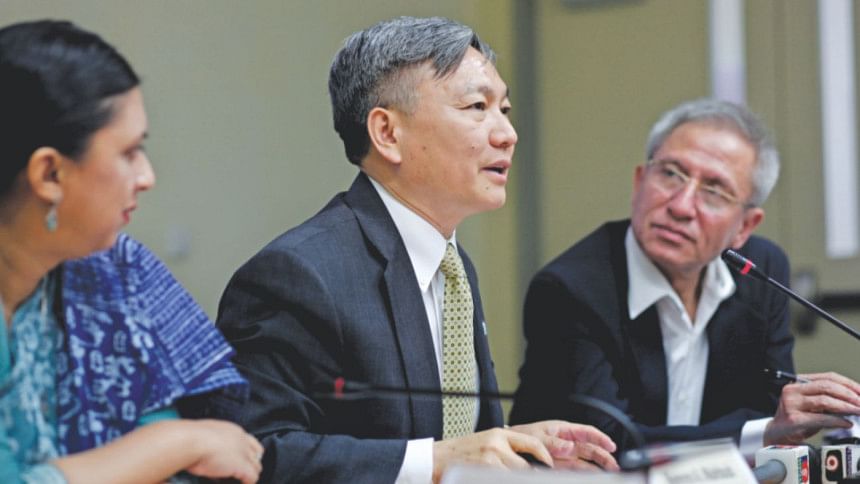Budget not feasible: WB

The World Bank yesterday questioned the feasibility of the proposed budget, saying the revenue growth target has clearly been overestimated.
The government has set a revenue target of over Tk 2.42 lakh crore, which is 37.5 percent more than the revised earning for the outgoing year.
Bangladesh achieved the highest revenue growth in fiscal 2007-08, of 26 percent -- when a military-backed caretaker government was in power.
“The size of the budget won't matter. But, such an unlikely increase in revenue poses a challenge on the feasibility of the budget,” said Zahid Hussain, lead economist of the WB's Dhaka office, at a media briefing on the proposed budget.
The WB economist said the high revenue growth target was not supported by revenue increasing reforms.
Moreover, a lot of VAT and customs rates reduce predictability for firms and open the door for increased unproductive lobbying.
He said the 100 percent increase in package VAT for small traders is on the high side. The VAT reforms continue to elude despite the passage of the law four years ago.
Qimiao Fan, country director of WB for Bangladesh, Bhutan and Nepal, also spoke.
The WB analysis also found that Bangladesh is gradually shifting towards costlier sources of funds to make up its budget deficit without giving much effort to utilise low-cost foreign financing.
Consequently, the interest burden is getting bigger.
Interest payments account for 11.7 percent of the total budget worth over Tk 3.40 lakh crore for fiscal 2016-17 and the allocation is the third highest after education and public administration.
On the other hand, as of May foreign financing worth $20.58 billion, which is half of the country's latest budget, remains unutilised, even though the interest rate on them would be 0.6 percent against 9.6 percent for domestic debt.
“The target for external financing is achievable, but looking at the way the government has been utilising the funds, it's not possible. There must be visible progress in the utilisation of funds in the pipeline,” Hussain said.
This fiscal year, only 15.4 percent of the aid in the pipeline was used.
The Washington-based multilateral lender said the budget for the upcoming year has been announced at a time when macroeconomic fundamentals, such as gross domestic product growth, inflation, exports, reserves, interest rates and monetary management are stable.
But there are not enough measures in the budget to boost falling private investments. Private investment as a share of the GDP went down to 21.8 percent in the outgoing year from 22.1 percent a year earlier.
“This declining investment is hampering much-needed job creation.”
The WB said the infrastructure crisis has become the binding constraint to Bangladesh's faster economic growth.
“Bangladesh has a competitive advantage thanks to its low-cost labour force. But our study shows infrastructure, particularly energy and transport, still remains a binding constraint,” said Fan in response to a query from journalists. If a project takes 8 to 9 years to complete, it does not give a good signal to investors, both domestic and foreign, as the delay would escalate their cost of doing business.
When an investor thinks of investing in a country, he/she looks at the certainty of financing, political stability and security issue, Fan said.
“But it is the infrastructure such as energy supply, roads and logistics and tax measures that has become the deciding factor for an investor,” he added.
On the fast-track projects, the WB said the progress of all projects, save for the Padma bridge and Rooppur 1st phase ones, is slow.
The current allocation level is inadequate for all except Padma, Payra and Rooppur projects, it said. As of now, 46 economic zones have been approved but they are yet to be developed for the use of the private sector.
On the implementation of the annual development programme, the WB said the project management reforms proposed in the budget are a welcome move, but further clarification is needed.
Commenting on the quality of implementation of the ADP projects, the development partner said a result-based monitoring and evaluation system has to be introduced.
The WB said greater flexibility is needed to facilitate the reallocation of relatively inefficient expenditure into high-priority projects.

 For all latest news, follow The Daily Star's Google News channel.
For all latest news, follow The Daily Star's Google News channel. 



Comments